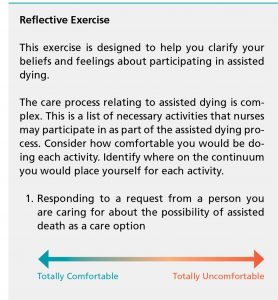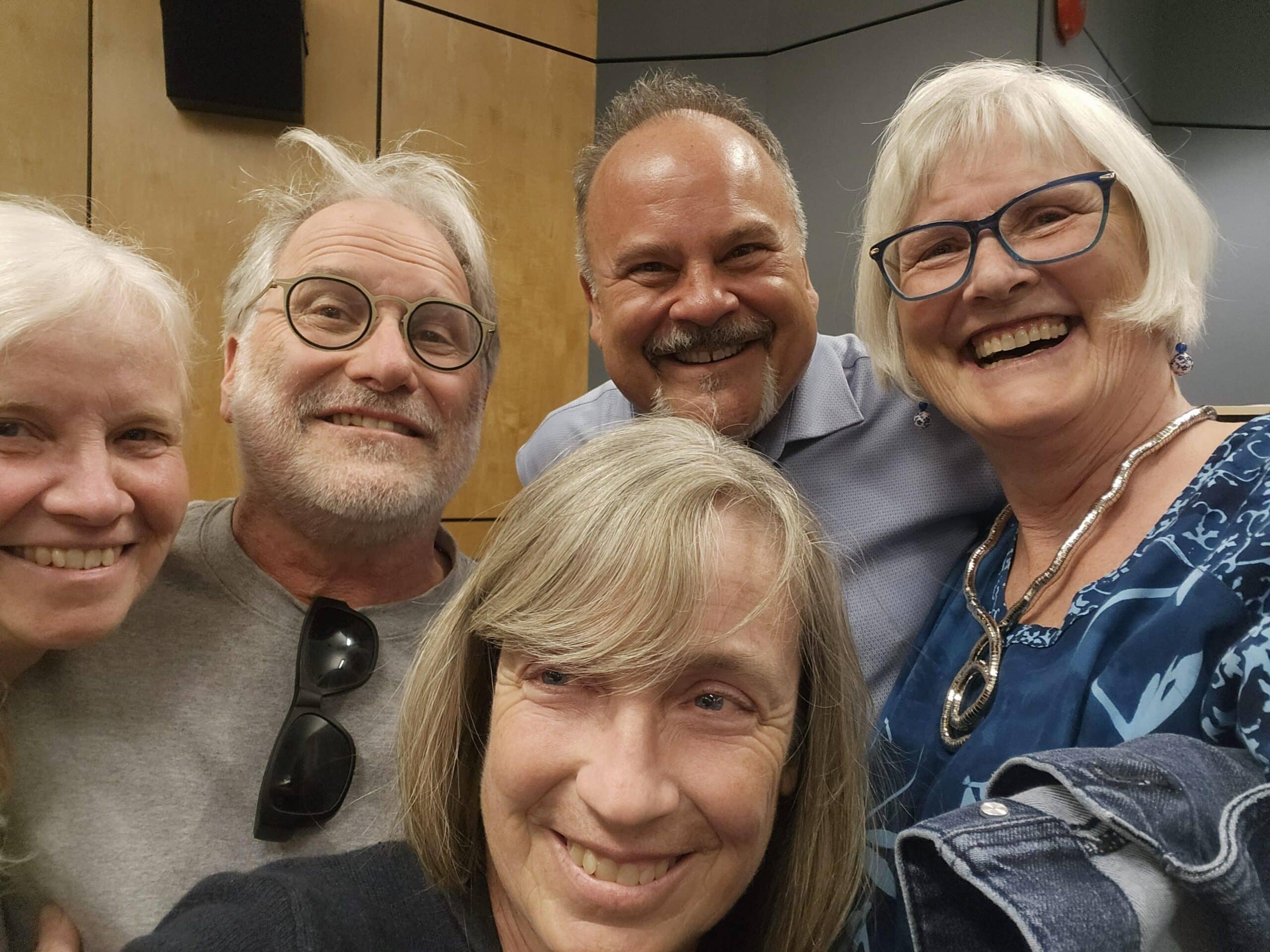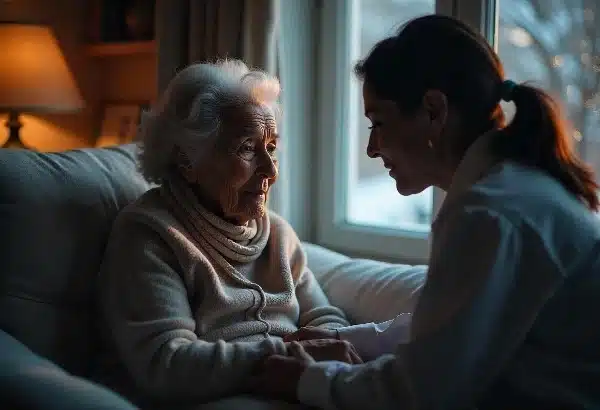In the year since Bill C-14 passed, legalizing Medical Assistance in Dying (MAID), over 1300 Canadians have exercised their right to die[1] [2]. Depending on your feelings about this topic, this may feel like a large or small number. It terms of total deaths, MAiD accounts for approximately 0.6% of the total number of deaths in Canada.
| Country |
Percentage of total deaths |
| Netherlands (2015)3 |
3.75% |
| Belgium (2015)[3] |
1.83% |
| Canada (2016-2017) |
0.6% |
| Oregon (2016) [4] |
0.37% |
Compelling accounts of people who have requested and received MAiD are freely available online, and in the popular media for people wishing to learn what the process is like, and how family might be affected by the dying person’s decision to end their life. Two examples of such stories are:
- For me, every breathe is work. Why Noreen Campbell chose assisted dying
- 1,300 Canadians have died with medical assistance since legalization—Here’s one man’s story
Where Do You Stand on Medical Assistance in Dying/Physician Assisted Dying?
Excerpted from Essentials in Hospice and Palliative Care: A Practical Resource for Every Nurse, 2016
What is currently missing from the commentary is information about how nurses and other health care professionals (HCPs) are deciding whether to support MAiD, participate in MAiD or oppose MAiD. Dr. David Wright, from the University of Ottawa, developed a series of questions to assist HCPs in discovering how they feel about MAiD. This series of questions are included in the Nurse’s text to specifically assist nurses to understand their own response to MAiD. At the end of the series of question is feedback that can assist and guide the next steps for health care professionals.
Featured below is the first of these questions . Respondents use the horizontal colour thermometer to identify the intensity of their If you are struggling to determine your position about MAiD, you may want to consider using these questions.

Accessing Education to Make an Informed Choice About MAiD
Fortunately, there are many webinars and online courses that will help new and established health care professionals learn about MAiD, the rights and obligations of health care professionals, and to make an informed decision about their desired level of participation. Examples of education currently available are:
- Association of Registered Nurses of BC (ARNBC)
ARNBC offered a webinar, “Medical Assistance in Dying: A Year in Review,” with a special focus on the context of nursing. A video and PowerPoint series are available at this URL
- College of Registered Nurses of BC (CRNBC)
CRNBC offers online course for assessors and prescribers involved in MAiD, running until September 2017. Access this course using this URL
- Life and Death Matters – In our own corner of education the nurses text, Essentials in Hospice and Palliative Care: A Practical Resource for Every Nurse, includes an extensive section on MAID/Physician Assisted Dying that includes relevant information for nurses in Canada and the US. A preview of the nurses text can be viewed here.
Life and Death Matters also has a newly published resource on MAiD for front line caregivers using the text, Integrating a Palliative Approach: Essentials for Personal Support Workers or Integrating a Palliative Approach: Essentials for Nursing Assistants. This resource discusses the latest legislation about assisted dying (passed after the text was published), the roles of front line caregivers and ways to communicate about assisted dying. The resource is available free of charge – please email us for your copy.
Moving Forward with MAiD
New CNA Code of Ethics for Registered Nurses Includes MAiD
The ethical and moral rights of Canadian registered nurses to make their own decisions about MAiD are protected in the new Code of Ethics for RNs issued by the Canadian Nurses Association.
Part 1: D Honouring Dignity, 12 reads:
Nurses understand the law so as to consider how they will respond to medical assistance in dying and their particular beliefs and values about such assistance. If they believe they would conscientiously object to being involved with persons receiving care who have requested such assistance, they discuss this with their supervisors in advance.
Code of Ethics for Registered Nurses (CNA, 2017)
Participants Needed to Research Nurse’s Perspectives on MAiD
Dr. David Wright and his team are currently recruiting across Canada for a research study on the perspectives of hospice palliative care nurses regarding the ethics of MAiD. They are interviewing registered nurses now and possibly a second time in one year. Anyone interested in participating, but especially anyone from the provinces of Saskatchewan, Manitoba, Quebec, or any of the Maritime provinces, as well as any of the territories, please contact [email protected].
Input Requested to Expand MAiD to People Not Addressed in Current Legislation
Bill C-14 does not address the needs of people diagnosed with dementia who want to request MAID in advance, nor does it address the requests from mature minors or from individuals who sole medical condition is mental illness. The Council of Canadian Academies (CCA) was asked by the Government of Canada to further study three particularly complex types of requests for MAiD. They have been charged with the following question:
What is the available evidence on, and how does it inform our understanding of medical assistance in dying (MAID) in the case of mature minors, advance requests, and where mental illness is the sole underlying medical condition, given the clinical, legal, cultural, ethical, and historical context in Canada?
Your input is requested and can be provided in one of these ways:
- Organizations: Submit information here
- Individuals, you may be able to offer your input through your professional association. For example, the ARNBC is requesting your input as they prepare their submission to the expert panel. Complete their questionnaire before August 18th.
HPNA Position on Assisted Dying
- HPNA Position Statements Endorsements – HPNA recently updated 2 new Position Statements listed below. If your association is interested in endorsing the Position Statements, please contact HPNA.
- Physician Assisted Suicide/Physician Assisted Death
- Guidelines for the Role of the RN and APRN When Hastened Death is Requested
Last Thoughts
My hope is that all individuals will be encouraged and able to participate or not participate in MAID to the degree that they are comfortable, and that every person will be supported with kindness and empathy, just as we desire to provide kindness and empathy to those we care for.
What does this mean in action? I am interested in hearing your views….
[1] https://www.cbc.ca/news/health/medically-assisted-dying-canadians-rob-rollins-1.4056700
[2] https://www.canada.ca/en/health-canada/services/publications/health-system-services/medical-assistance-dying-interim-report-dec-2016.html#t1
[3] https://www.dyingforchoice.com/docs/AssistedDyingPracticeInBeneluxWhitepaper1b2016.pdf
[4] https://public.health.oregon.gov/ProviderPartnerResources/EvaluationResearch/
DeathwithDignityAct/Documents/year19.pdf








